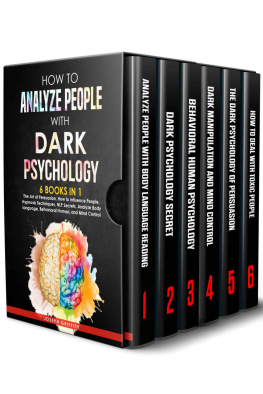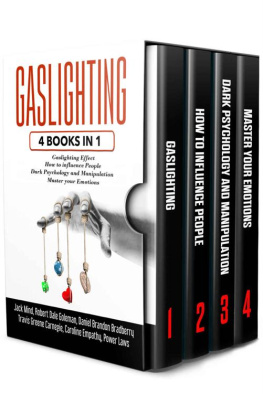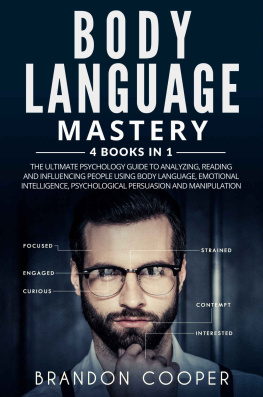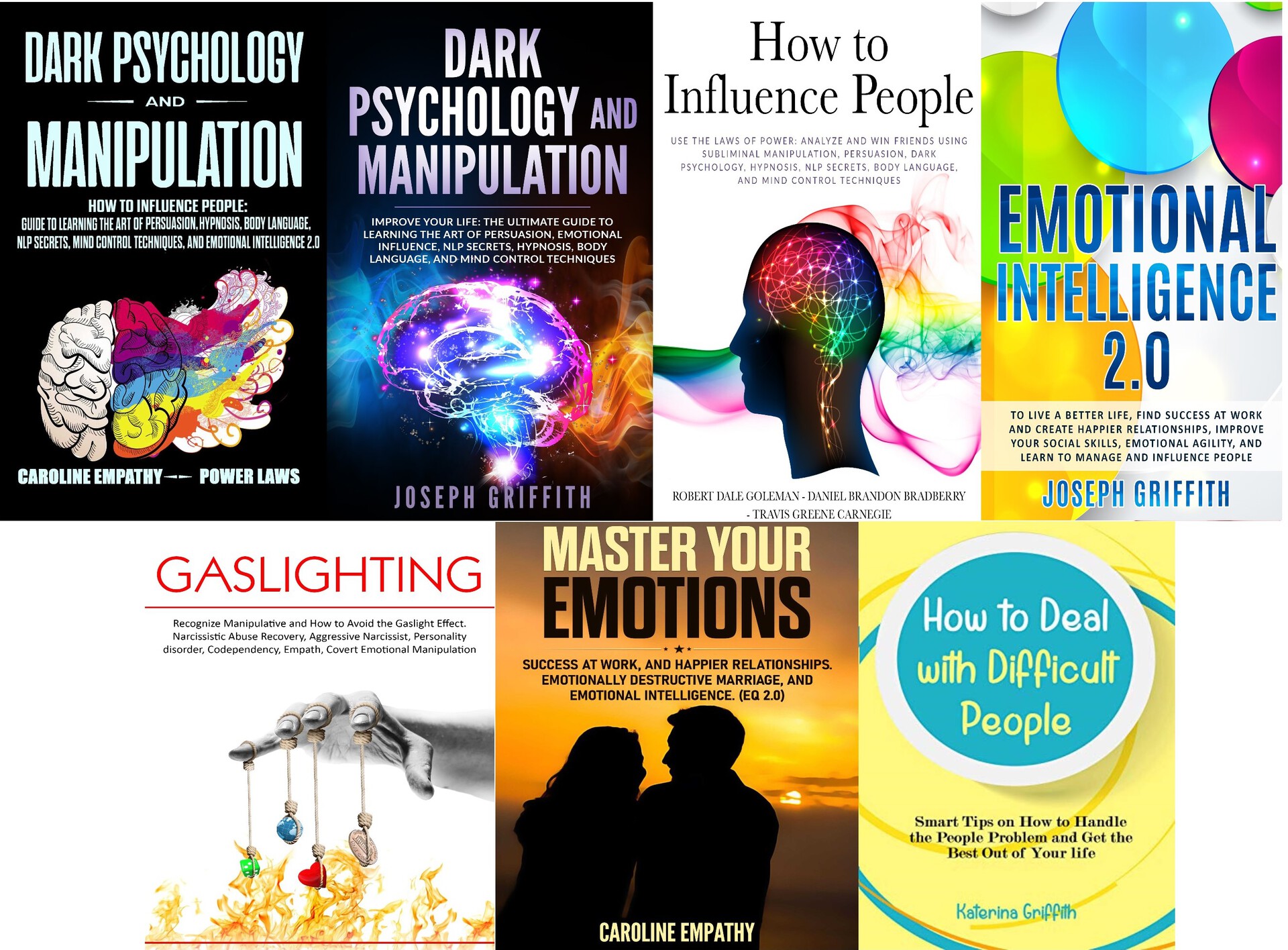DARK PSYCHOLOGY
7 BOOKS IN 1
The Art of Persuasion, How to influence people, Hypnosis Techniques, NLP secrets, Analyze Body language,
Gaslighting, Manipulation Subliminal,
and Emotional Intelligence 2.0
By Robert Dale Goleman , Daniel Brandon Bradberry , Travis Greene Carnegie
Katerina Griffith , Joseph Griffith , Caroline Empath , Laws Power , Jack Mind
DARK PSYCHOLOGY AND MANIPULATION (V.1)
DARK PSYCHOLOGY AND MANIPULATION (V.2)
HOW TO INFLUENCE PEOPLE
EMOTIONAL INTELLIGENCE 2.0
GASLIGHTING
MASTER YOUR EMOTIONS
HOW TO DEAL WITH DIFFICULT PEOPLE
f
Dark Psychology and Manipulation
How to influence People: Guide to Learning the Art of Persuasion,
Hypnosis, Body Language, NLP Secrets, Mind Control Techniques,
And Emotional Intelligence 2.0
Caroline Empathy & Power Laws
Introduction
Next time you are in a public space look around you and examine the people that are walking about. What are they doing? Who are they with? In which direction are they going? If you can imagine that last time you went to your supermarket of choice, you can probably recall people pushing carts of food around the aisles. Maybe with their spouse and children, or with friends. Maybe alone. Each one of them has one thing in common: they want to buy their groceries for the week and get on with their day.
In that sense, the motivation behind their behavior is patently visible. A father walks over to the dairy section and grabs a gallon of %2 milk. He then scratches off the item from the grocery list and walks towards the next item. The grocery store is a nice metaphor for motivation in the real world. Everyone is doing something because they have some item that needs to be crossed out from a list. At times it will be easily doable, like getting a haircut. At other times it will be complex and time-dependent, like getting a Ph.D. in astrophysics.
Whatever the case, people have motivations. Everyone has a metaphorical grocery list they want to fulfill, whether they know what is on the list or not. There is where human psychology gets tricky. Some of us know what we want. Some of us dont know. Some of us are open to suggestions and recommendations. Still, others are constantly seeking for direction from others. Some of us know what our moral values and core beliefs are. Others do not. One second you can be reaching for the creamy peanut butter, and the next you are looking at the crunchy version. Or perhaps you drop peanut butter altogether and look towards the organic nut butter. Or perhaps you reach for the peanut butter and mixed jelly jar.
To understand what dark psychology is, we first need to establish what psychology is as a whole. Psychology is defined as the study of the human mind, especially in regard to the connection between thoughts and behaviors. Even in the times of the great Greek philosophers, scholars were fascinated by the workings of the mind and how it related to our actions and reactions.
Modern psychology was founded by a German doctor named Wilhelm Wundt. Wundt was a physiologist and philosopher, and his interest in these fields led to the development of his theories about the relationship between body and mind.
In 1879, Wundt founded the worlds first psychology laboratory, located at the University of Leipzig. He was determined to prove that the inner workings of the mind could be measured and examined much like any other science experiment. He developed theories and experiments based on the following principles:
- Voluntarism - the process of organizing the mind
- Reductionism - the ability to isolate each part of the mind
- Introspection - the ability to perform detailed self-examination
Using these principles and a modified experiment from his days in physiology, Wundt developed a method of testing the psyche of his subjects. When he was medical doctor, Wundt had tested the reaction time of his patients to certain physical stimuli in a controlled environment, like a noise or a flashing light (the precursors to modern hearing or vision tests). Wundt wondered if he could test the mind in a similar fashion.
The result was an experiment in which Wundt had his subjects concentrate on a metronome, and then describe how the metronome made them feel. By detailing the sounds, sensations, and thoughts they had when focusing on the metronome ticking, Wundt was able to begin determining the way the brain is affected by controlled stimuli. He even attempted to measure the levels of chemical activity in the brain during and after these experiments.
While Wundts work was primitive by the standards of modern psychology, it was groundbreaking enough for him to have trained over one hundred students in the budding field, and he inspired the next generation of psychologists; Sigmund Freud, who fathered psychoanalysis; Carl Jung, who expanded upon Freuds theories and developed analytical psychology; William James, who brought modern psychology to America; and Alfred Alder, who formulated the connections between emotional needs and social skills. These men created the body of work that would blossom into the many branches of psychology and psychotherapy we see today, including cognitive-behavioral therapy.
Dark Psychology is a branch of psychology that fascinates people across the globe who are interested in topics like understanding the criminal mind, better understanding the darker thoughts that control human behavior at all ages, and the conscious actions people take to influence others using psychological manipulation.
At its core, Dark Psychology is the specified study of the more wicked side to human nature: what defines it, how to observe it, where the lines are and how it can be utilized for both constructive and nefarious purposes. It covers mild uses like a clever car salesman who continuously has the best sales numbers on his team because he is able to read his customers and build an amiable connection with them based on observations to the severe uses like studying the mind of criminals who use their understanding of human behavior to victimize others.
Persuasion, manipulation, and other forms of influence are ubiquitous. You can pick up on some obvious signs here and there, but there are also hidden secret ways that others control you which you might never be able to fully comprehend.
Many reasons exist that can make you yearn to be a more persuasive person. Perhaps you feel as though you are already under the deep influence of others and you wish to break yourself free. Maybe you are the kind of individual that can easily fall for the charm of others and now is the moment for you to be able to better protect yourself against any types of influence that might happen to you.
Perhaps you are trying to sell something, maybe yourself or your brand, and you need to figure out how to get people to be more persuaded by you in order to help you achieve the things that you want in this life. No matter where you are or what you are trying to do, you have all the tools that you will ever need to be persuasive or influential with you already.
Before getting into this book, there are a few things that you need to know to be introduced to this topic, in order to get into the right mindset as you read through this text. First, understand that there are no two manipulators that are alike. There are no two easily persuaded people that are the same either. Though it might seem like this sometimes, especially since you can influence a group all at once, you cant let yourself fall into a thinking pattern where you place everyone in the same category.







